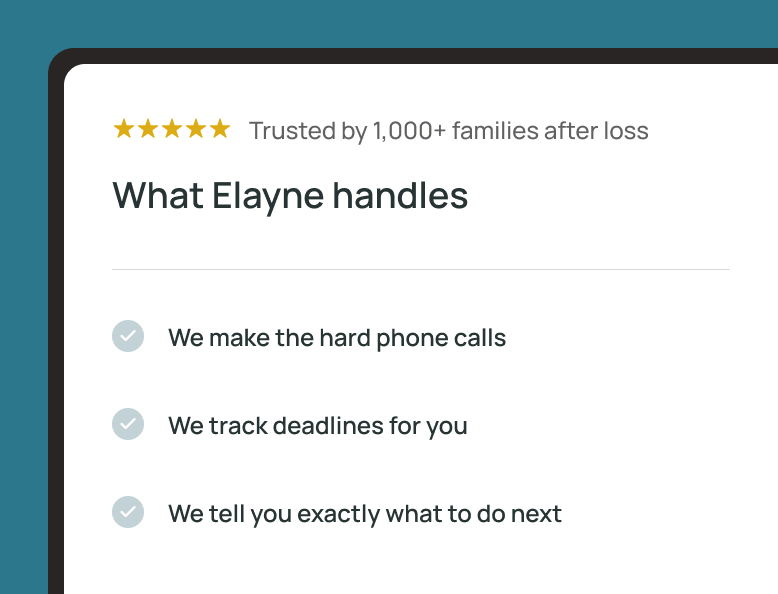Key Takeaways
- Often, the most helpful thing we can do is listen with patience and care.
- Simple, sincere words are usually better than trying to offer explanations or advice.
- Continued support, even in small ways, helps people feel remembered and less alone over time.
Introduction
When we see someone grieving, it can be hard to find the right words to say. We want to be supportive, but we’re also afraid of getting it wrong. So we hesitate, stay quiet, or avoid the topic altogether.
But helping someone through grief doesn’t require a perfect line. What matters most is showing that you care. A kind gesture, a thoughtful phrase, or just being present can make someone feel less alone during one of the hardest moments of their life.
In this article, we’ll share ways to support a person who’s grieving. Whether you're comforting a friend, family member, or colleague, you’ll find examples of what to say, what to avoid, and how to offer ongoing care.
What to Say: Simple and Sincere Phrases
Words can’t take away grief, but they can help ease the weight of it. Remember, the goal isn’t to provide answers or silver linings. It’s to acknowledge the pain and remind the person that they’re not alone.
Some phrases to consider:
- “I’m here if you need anything.”
- “I’m thinking of you and your family.”
- “If you ever want to talk about them, I’d love to listen.”
- “I remember when [Name]...” (share a meaningful memory if the moment feels right)
- “You don’t have to say anything. I just wanted to be here with you.”
- “Take all the time you need. I’ll be here when you’re ready.”
Keep it simple, heartfelt, and open-ended. Your goal is opening the door for connection, which is often what a grieving person needs most.
The Power of Listening
Often, people who’ve just experienced a loss aren’t looking for advice or solutions. They just want space to express what they’re feeling, and have someone who can be there for them.
During conversations, let them decide how much they want to share. They might want to tell stories. Talk through what happened. Or, say very little at all. Every person handles grief differently, and all of those responses are valid.
Here are a few ways to be a supportive listener:
- Make eye contact and put your phone away.
- Let them set the pace, and follow their emotional cues.
- Don’t interrupt or rush to fill silence. Let them take their time.
- Avoid shifting the conversation to your own experiences.
- Let their feelings come out as they are. Don’t try to reframe them.
Ongoing Support Beyond the First Few Days
In the early days of grief, people often receive an outpouring of support. But as time passes, that support tends to fade, and the grieving person is often left holding the weight of their loss alone.
That’s when continued connection becomes even more important.
Even small, consistent gestures can help remind someone that they haven’t been forgotten. Here are a few ways to stay connected:
- Mark important dates. Anniversaries, holidays, and birthdays can be especially difficult. A short message that says “I’m thinking of you today” can go a long way.
- Offer specific help. Instead of saying “Let me know if you need anything,” try “Can I bring you dinner this week?” or “Could I help with errands this Saturday?”
- Send a check-in text every few weeks. “Thinking of you today. No pressure to respond.”
- Celebrate milestones: If they’re ready, help mark moments of healing or remembrance in a way that feels right for them (lighting a candle, a donation in memory of their loved one, …).
What to Avoid Saying
Even with the best intentions, some comments can land the wrong way. That doesn’t mean you should be afraid to speak, but it does help to be aware of phrases that could unintentionally minimize grief.
Here are some lines to avoid:
- “I know how you feel.” Even if you’ve experienced something similar, every loss is different. This can make someone feel like their grief is being compared or dismissed.
- “You can have another [child, partner, etc.].” Grief is about the person who is gone. Suggesting they’re replaceable only deepens the pain.
- “At least they lived a long life.” or “At least you had time to say goodbye.” Anything that starts with “at least” tends to diminish the loss.
- “You’ve got to stay strong.” or “It’s time to move on.” This often comes off as pressure to hide emotion.
- Avoiding the topic altogether. Saying nothing at all, or pretending everything is normal, can make the person who’s grieving feel isolated and unseen.
Other Meaningful Ways to Offer Comfort
These actions don’t need to be big. The goal is to remind someone that they’re not alone, and make it easier for them to get through each day.
Ideas to consider:
- Write a sympathy card or letter. A handwritten note is deeply meaningful, and provides something they can return to for comfort.
- Send a thoughtful care package. Include favorite snacks, a blanket, candles, or book they might enjoy.
- Help with everyday tasks. Walking their dog, doing laundry, or taking care of small errands.
- Drop off a meal. Include disposable containers and a note with something like, “No need to reply. Just thinking of you.”
- Make space for every emotion. Grief includes sadness, anger, numbness, even humor. There’s no right way to feel. Let them express it all without judgment.
FAQs
1. What if I don’t know what to say?
That’s okay. Even something as simple as “I’m here if you need anything” can mean a lot. Acknowledging the loss matters more than having the perfect words.
2. Is it okay to cry with someone who’s grieving?
Yes, it’s okay to express emotion. It shows that you care and are willing to share the weight of their grief.
3. Should I mention the person who died?
If it feels appropriate, absolutely. Many people who are grieving appreciate hearing their loved one’s name. A shared memory or kind story can be a beautiful gesture.
4. How long should I keep checking in?
As long as it feels needed. Grief doesn’t have an endpoint. Even months or years later, a small message or check-in can make a big difference.
5. What if they don’t want to talk?
Respect their space. Let them know you’re there whenever they’re ready.
{{blog-cta-small}}
Conclusion
Supporting someone through grief doesn’t require a grand gesture. It’s about being thoughtful, being kind, and being available. Your presence matters, and your care will have a bigger impact than you probably realize.
Whether it’s through a short text, caring words, or sitting alongside them and listening, each of those acts can speak volumes. And, ultimately, that’s what makes a difference: not trying to fix the grief, but staying close while someone moves through it.















































